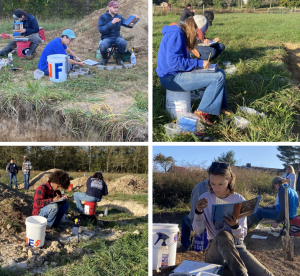After a nearly 20-year hiatus, the University of Florida Soils Judging Team made a successful return to the field. The four-member squad competed in the 2024 Southeast Regional Collegiate Soils Judging Contest hosted by the University of Kentucky in Lexington. Under the supervision of Dr. Heather Enloe and graduate student Therese “Tess” Thompson, in the UF/IFAS department of soil, water, and ecosystem sciences, the team finished eighth out of 12 universities. All four team members are undergraduates within the College of Agriculture and Life Sciences (CALS). They also are part of the Agronomy-Soils Club, which houses the Soil Judging Team.
Soil judging is a hands-on competition. It challenges students to quantify the suitability of an area for building development using their on-site analysis of soil properties and site characteristics. Soils support buildings and roads, as well as the water and nutrients necessary for plant growth. The skill set used in the competition applies to sustainable land-use in developed areas as well as agricultural lands and natural areas. Soil properties change due to differences in climate and geology, so soils in Florida differ from those in Kentucky.
SWES major Audrey Plauche said she and her three teammates learned a lot about soils in the Bluegrass State.
“After experiencing the soils of that region of the U.S., I have an even more profound admiration for the rich diversity of soils,” she said.

A Journey of Discovery
The competition was both a professional and personal adventure for the UF team. Over three practice days leading to the competition, team members tackled 12 soil pits in the countryside surrounding Lexington. It allowed them to refine their ability to delineate horizons and describe soil properties under tight time constraints.
“The rolling hills and mountains were breathtaking, and the amount of silt, clay, and loess was mind-blowing,” team member Dante Del Rosario said. “We delineated horizons, hand-textured soils, defined soil-water properties, and deciphered landscape positions to classify and interpret the soils of Kentucky.”
The Environmental Management in Agriculture and Natural Resources (EMANR) major added that the competition allowed him to experience soils he had only read about in textbooks. For the team, Kentucky’s soil profiles – marked by features like fragic horizons and manganese redox concentrations – provided a sharp contrast to Florida’s sandy landscapes.
“Soil judging doesn’t stop at analyzing the soil—it extends to interpreting its practical uses,” noted EMANR major Katya Kasprzak. “Interpreting the soil’s suitability for basements, septic tanks, and roads was so exciting to me. It’s a reminder that soil judging is directly applicable to real-world challenges.”
Teamwork and Growth
Most collegiate soil judging teams practice throughout the year leading-up to the regional competition. Due to a variety of reasons, the UF team came together the month before the competition. Once in Lexington, the team worked together to adapt and improve with every practice pit.
“Tess Thompson was crucial in the team’s success. She was patient and persistent in teaching us to hand texture soil. She passed along knowledge, advice, and lessons from her undergraduate experience in collegiate soil judging. We would not have had the success and deep learning we experienced in Lexington without Tess,” Dr. Enloe explained.

“This was an invaluable learning experience, introducing and reinforcing core skills needed as a soils professional and offering us a chance to apply knowledge gained throughout our undergraduate coursework,” Dante said. “It truly was an experience like no other in my academic career.”
“Competition day was stressful, and I definitely did not perform as well as I would have personally liked to,” Audrey admitted. “I’m still extremely proud that I was able to show an appreciable improvement in my knowledge and skill.”
Beyond the technical skills, the contest fostered “soft skills,” such as teamwork, communication, and adaptability.
“The team possessed a strong sense of comradery and spirit,” Dante said. “We shared critical moments of learning and returned from the contest better versed in soil science (and better friends)!”
“This is an extremely talented team that came together to learn quickly and overcome challenges,” said Enloe. “These are the experiences that are remembered and applied to future challenges within and outside of the classroom.”
Making It Possible
The UF team’s participation was made possible through funding from the UF/IFAS VP Promise program, the Agronomy-Soils Club, and the Florida Association of Environmental Soil Scientists (FAESS). VP Promise, championed by UF Vice President for Agriculture and Natural Resources Dr. Scott Angle, supports “immersive learning opportunities that bridge academics with practical experiences in agriculture, life sciences, and natural resources.”
“We are extremely grateful for the support of the Agronomy-Soils Club, CALS, and the VP Office,” said Enloe. “In particular, the team would not have been complete without Tess as our assistant coach and the support of her major professor, Dr. Davie Kadyampakeni at the Citrus Research and Education Center.”
She added that the team also received incredible support from outside UF.
“Before the competition, two FAESS members spent a day with us describing Florida soil profiles,” Enloe said. “While at the competition, we connected with regional and state USDA Natural Resource Conservation Service Soil Scientists and the faculty coaches and students from the competing universities.”
Along with Plauche, Del Rosario, and Kasprzak, the UF team includes Gabriella “Gabby” Rutan. They hope their involvement inspires future students to explore the field.
The UF Soils Judging Team’s return marks the university’s presence in this long-held event and highlights UF’s commitment to nurturing the next generation of soil scientists. The Agronomy-Soils Club will continue to support the Soils Judging team for next year’s regional competition.
Featured image credit: UF Soils Judging Team
 7
7
